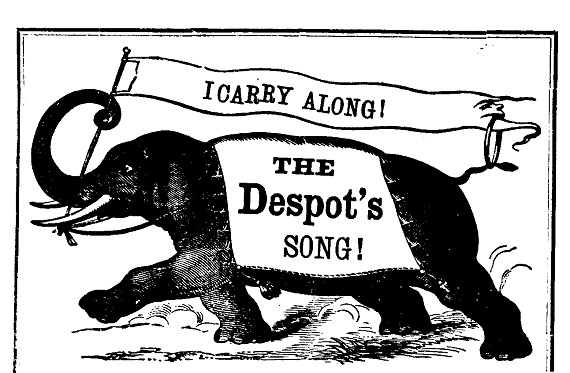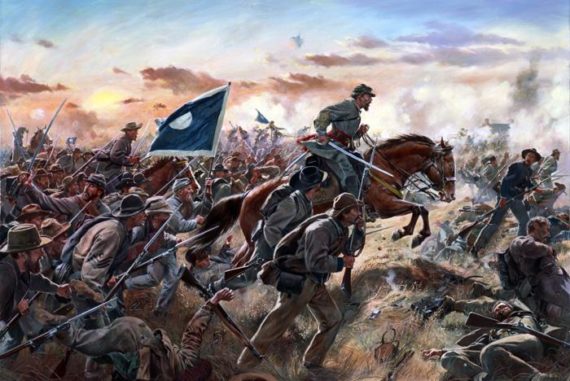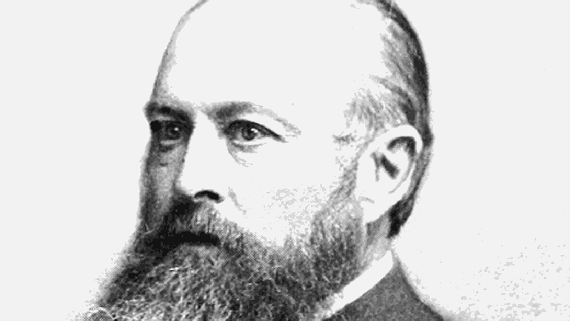Southern history contains many fine examples of literary and artistic merit long ignored by contemporary scholars and forgotten by the American public at large, both North and South. Much of this is due to the impact that the War had on the perception of the Southern people. Students in American literature will get a cursory understanding of Southern literature, primarily William Faulkner and Flannery O’Connor, but most are left believing that the South was a wasteland of intellectual material. Some scholars in the twentieth century took an interest in antebellum Southern literature and found it to be a delightfully refreshing contrast to the often banal works of their Northern counterparts. The South has always had a story to tell. Jay B. Hubbell’s The South in American Literature, 1607-1900 is an excellent primer for early Southern writing.
Francis Orray Ticknor is one of these long forgotten Southern poets. Born on this day (Nov 13) in Jones Country, Georgia in 1822, Ticknor received a medical degree from the Philadelphia College of Medicine. He returned to Georgia and opened a medical practice in Shell Creek. After he married in 1847, Ticknor relocated to Torch Hill, his plantation near Columbus, GA (now part of Fort Benning, GA).
During the War, Ticknor offered his services to the Confederate army as a physician and attended to wounded soldiers at the Confederate hospital in Columbus. It was in this capacity that Ticknor received the inspiration for his most famous poem, “Little Giffen.” Ticknor treated the sixteen year old Giffen at the hospital then took the young man to his plantation to let his wife nurse him back to health and teach him to read and write. But before he was completely healed Giffen left Torch Hill and headed back to the front. Ticknor never heard from him again.
Ticknor published works on horticulture in addition to hundreds of poetic verses on everything from the War to romantic descriptions of hearth and home. Below are three of his better pieces. The first, “The Despot’s Song,” was published in a Baltimore newspaper in 1862. It is a funny and stinging characterization of “Honest Abe.” The second, “The Little Giffen,” is his most famous work. Published in a North Carolina literary magazine in 1867, it became a ballad for Southerners weary of the War and saddened by defeat but still sure of Southern honor and chivalry. The last, “Twilight on ‘Torch Hill'” is from The Poems of Francis Orray Ticknor, M.D. and is a song of home.
THE Despot’s SONG!
With a beard that was filthy and red,
His mouth with tobacco bespread,
Abe Lincoln sat in the gay white house,
A wishing that he was dead –
Swear! Swear! Swear!
Till his tongue was blistered o’er,
Then in a voice not very strong;
He slowly whined the Despot’s song;
Lie! Lie! Lie!
I’ve lied like the very deuce!
Lie! Lie! Lie!
As long as lies were of use;
But now that lies no longer pay,
I know not where to turn,
For when I the truth would say,
My tongue with lies will burn!
Drink – Drink – Drink!
Till my head feels very queer!
Drink – Drink – Drink
Till I get rid of all fear!
Brandy, and Whiskey, and Gin,
Sherry, and Champagne, and Pop,
I tipple, I guzzle, I suck’em all in,
Till down dead drunk I drop.
Think – Think – Think!
Till my head is very sore!
Think – Think – Think!
Till I could’nt think any more;
And its oh! to be splitting of rails,
Back in my Illinois hut,
For now that every thing fails,
I would of my office be “shut!”
Jeff! Jeff! Jeff!
To you as a suppliant I kneel!
Jeff! Jeff! Jeff!
If you could my horrors feel;
You’d submit at discretion,
And kindly give in,
To all my oppression,
My weakness and sin!
LITTLE GIFFEN
Out of the focal and foremost fire,
Out of the hospital walls as dire;
Smitten of grape-shot and gangrene,
(Eighteenth battle, and he sixteen !)
Spectre! such as you seldom see,
Little Giffen, of Tennessee!
“Take him and welcome!” the surgeons said
Little the doctor can help the dead!
So we took him; and brought him where
The balm was sweet in the summer air;
And we laid him down on a wholesome bed—
Utter Lazarus, heel to head!
And we watched the war with abated breath,—
Skeleton Boy against skeleton Death.
Months of torture, how many such?
Weary weeks of the stick and crutch;
And still a glint of the steel-blue eye
Told of a spirit that wouldn’t die,
And didn’t. Nay, more! in death’s despite
The crippled skeleton “learned to write.”
Dear mother, at first, of course; and then
Dear captain, inquiring about the men.
Captain’s answer: of eighty-and-five,
Giffen and I are left alive.
Word of gloom from the war, one day;
Johnson pressed at the front, they say.
Little Giffen was up and away;
A tear—his first—as he bade good-by,
Dimmed the glint of his steel-blue eye.
“I’ 11 write, if spared!” There was news of the fight;
But none of Giffen.—He did not write.
I sometimes fancy that, were I king
Of the princely Knights of the Golden Ring,
With the song of the minstrel in mine ear,
And the tender legend that trembles here,
I’d give the best on his bended knee,
The whitest soul of my chivalry,
For “Little Giffen,” of Tennesse
TWILIGHT ON “TORCH HILL”
It is eve at our eyrie; the river
Falls dim in its tremulous gaze;
There’s a mantle of mist and the quiver
Of stars through the violet haze.
Soft twilight! the far silent city
Sleeps, veiled in the valley beneath,
Eclipsed by the flash of this pretty
Bright “ruby-throat” here on his wreath.
Shall I try, ere the daylight is over,
So high from its dust and its din,
How much of a “town” I can cover
With the leaf of a jessamine?
All the life and the light of the city
Shall I daintily hide from my sight,
With its sorrow that weeps, and the pity
That walks with the angels to-night?
Sweet mercies that shadow me! Never!
Lest the soul in my body should die,
Ere the sparkle fades out of the river,
Or the light from the violet sky.







